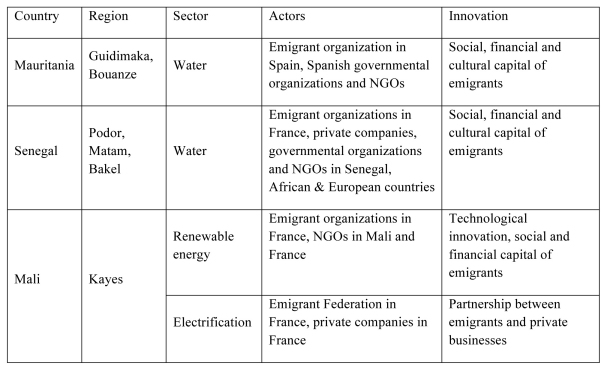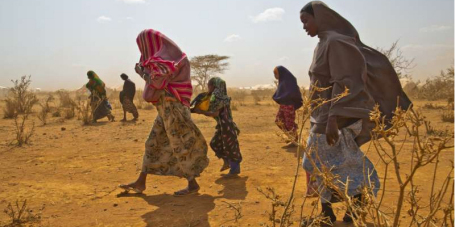Western Sahel in Africa
Future projections suggest that the Sahel region will be severely affected by climate change. Irregular rainfalls, prolonged drought periods and vulnerable ecosystems always required a high level of adaptation from its populations. Population mobility in the form of migration is a common strategy to cope with the variable climate. An important part of the economies of many Sahelian countries strongly depend on migrants’ remittances which are mostly directed to support family members and to invest in homes and businesses for the projected return (Sow et al. 2014). Most of the transnational Sahelian emigrants remain in the African countries (called “South”); a smaller number migrate to the OECD countries (“North”). Remittances transferred home from countries with stronger economies are usually higher due to higher incomes and stronger currency. Data on remittances at the national level are given for Mali, Mauritania and Senegal in Table 1.

Table 1: Emigrants to and remittance flows from “North” and “South” for Mali, Mauretania and Senegal (data for 2010 in percent; source: World Bank 2011)
On average, African immigrants were found to remit twice as much as immigrants from other developing countries (Bollard et al. 2010). For example, Malians and Senegalese living in France transfer 10-15% of their monthly income (ADB 2007). In the Senegal River valley, migrant remittances provided for 65% of households’ cash income (household survey, Findley & Sow 1998). Data on remittances are based on estimates since 25-80% of all transfers are sent using informal channels like hand delivery (Page & Plaza 2005; Sow & Alissoutin 2010; ADB 2007).
In the 1960s, sub-Saharan African migrants in France have created organisations and initiated co-development projects directed to the construction of schools, clinics, drinking water and irrigation systems. Since the 1990s migrant organisations and co-development activities have been extended to Spain, Italy, Germany, UK and other countries. Governmental support has been made available in France, Spain and Italy and by the EU. However, European states have the tendency to use developmental strategies to achieve immigration control following the pathway of adaptation to prevent forced migration, which can sometimes lead to cooperation failures, as in the case of Mali (see Scheffran, Marmer & Sow 2012). Institutional support for co-development programmes is being offered by the countries of origin, albeit to a different degree.
A French study of projects initiated and financed by migrants from the Senegal River valley living in France showed that 36% of them were dedicated to health care and education and 23% to water and agriculture (Gonin 2001). Apart from physical and social capital invested in co-development, innovation and knowledge transfer also play an important role. For example, the Diaspora Association of Engineers for the Development of the Sahel provided support and advice for over 200 projects in the Kayes region of Mali (Sall 2005).
Based on qualitative, quantitative and micro-level analysis, case studies demonstrate contributions of migrant networks to climate adaptation of their communities in water, food and energy (Table 2). All migrant organisations are located in Western Europe, while most of the partnerships are located in the Senegal River valley.

Table 2 Summary of case studies (Scheffran et al. 2012)
Dr. Elina Marmer
Institute for International and International Comparative Education
Universität of Hamburg
Dr. Papa Sow
Center for Development Research
University of Bonn
Prof. Dr. Jürgen Scheffran
Research Group Climate Change and Security
University of Hamburg
- Sow, P., Adaawen, S.A., Scheffran, J. (2014). Migration, Social Demands and Environmental Change amongst the Frafra of Northern Ghana and the Biali in Northern Benin, Sustainability, 6 (1), pp. 375-398.
- World Bank (2011). Migration and Remittances Factbook. Second Edition.
- Bollard, A., McKenzieb, D., Mortenc, M. (2010). The Remitting Patterns of African Migrants in the OECD. Journal of African Economies 19 (5), 605–634.
- ADB (2007). Migrant Remittances: A Development Challenge. African Development Bank.
- Page, J., Plaza, S. (2005). Migration Remittances and Development: A Review of Global Evidence. Journal of African Economies 15 (2), 245-336.
- Sow, P., Alissoutin, R.L. (2010). ICT and codevelopment in Senegal and Catalonia, Mireia Fernandez-Ardevol et Ros Adela éditions, IN3 Spain.
- Scheffran, J., Marmer, E. & Sow, P. (2012): Migration as a contribution to resilience and innovation in climate adaptation: Social networks and co-development in Northwest Africa, Applied Geography, 33, 119-127.
- Gonin, P. (2001). Les migrations venant du basin du fleuve Senegal vers l’Union Europèenne. Lecture for the symposium “L’etat des migrations vers l’Europe. Facteurs d’emigration, politiques d’immigration”. Brussels, 21.03.2001
- Sall, B. (2005). Remittances and Economic Initiatives in Sub-Saharan Africa. In: Migration, Remittances and Development. OECD. Paris.

